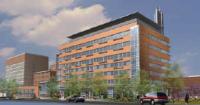
The number and frequency of ambulance sirens dwindled. Fewer hospital staff passed the waiting area. I had been sitting there, waiting for nearly three hours. By 8:30 p.m. I was the only one around when a nurse who’d been in the operating room came out. She spotted me, changed direction and approached me.
“You the husband of the horse woman?”
I nodded expectantly.
“She’s doing just fine,” the nurse said. “But don’t tell anybody I told you.” She knew I’d been waiting a long time and I sensed her telling me my wife Jayne’s condition was good, made us both feel better. And that had been the atmosphere at Lakeridge Health Centre in Oshawa nearly all that day. I say nearly, because things didn’t start out that way.
This is the story of a mishap, the kind many families have experienced and endured. On Tuesday evening after work, my wife Jayne made her way to a stable east of town to enjoy the relaxation and distraction of riding her young dressage horse. Part way through their workout, her horse was startled by something and bucked several times. Realizing she couldn’t get back into the saddle, Jayne jumped off the horse, but landed awkwardly on her shoulder.
When I arrived at Port Perry Hospital, an evening ER nurse was already questioning Jayne about the fall. Before too long, she’d been x-rayed and a doctor explained there was a fracture of her upper humerus bone; it appeared the ball portion of the bone was broken…badly. But only the sophistication of computerized axial tomography (a CAT scan) would reveal the specifics.
Problem was, the earliest she could get a CAT scan was Thursday, almost two days after the tumble. And, he said, the earliest Lakeridge Health Centre in Oshawa could see repairing the break would be the weekend. I’m not sure which hurt Jayne worse, the break or the prospect of a potential four-day delay of the surgery. Anyway, two days later, we dutifully arrived in Oshawa for the scan. When an orthopaedic surgeon we’d contacted looked at the scan, he calmly explained the fracture and the surgical alternatives.
“It will probably require a prosthesis,” Dr. Michael Martin said. He showed us computer images of a steel ball and shaft replacement for the shoulder joint and reassured us that Lakeridge performed a fair number of these procedures each year. The diagnosis and prognosis were grim. Even more grim, it seemed, was the likelihood she would have to endure another couple of days of pain before anything could be done – prosthesis or otherwise.
I think that’s when the surgeon in the doctor gave way to the humanity in the doctor. Indeed the humanity of the system. Within minutes, we felt, the health care monolith that seemed prepared to shuffle this accident and its misery off to a scheduling computer, took on a face and revealed its heart. Jayne needed a surgeon, a surgical team, an available OR and (perhaps most important) an admission bed. Things began looking up when a woman with a clipboard entered the cubicle where Jayne and I still stared at the computer images of the prosthesis.
“Hi. My name is Tracey,” she said. “I’m your ortho-nurse navigator.”
I’d never heard of that kind of nurse before. But despite her bureaucratic title, I kind of liked the idea that someone could lead us through this mess. Sure enough, through the midday, the afternoon and into the early evening, a steady stream of medical-care specialists paraded through our cubicle, doing EKGs, blood tests, and even osteoporosis-prevention planning. Most important of all, however, these hospital professionals all seemed focused on getting my wife to surgery…surgery that would not be delayed until Saturday, but would take place that night. Suddenly, it seemed, my wife had become the number one priority in the hospital. And that really lifted our spirits.
The rest went like clockwork. The anaesthetist explained what he would do. The chief surgeon, Dr. Samir Chhabra, explained what he would do. The nursing staff explained what they would do. And by 5 that afternoon, they started doing what they’d promised. And I just sat patiently in the waiting area. That’s why the sudden arrival of the nurse inquiring if I were “the husband of the horse woman” seemed so welcome.
By 9 p.m., the surgeons had both informed me that the prosthesis implant had not been necessary. Instead, they’d implanted a plate and screws into her upper humerus, they hoped, to salvage the natural bone. They even showed me a high-resolution image of the repaired shoulder. And by 10:30 Jayne was on antibiotics and painkillers, in a recovery bed and drifting into the most restful sleep she’d had in 72 hours.
A health facility, we feared had let us slip through the cracks, had shown genuine concern and given a family hope when it most needed it.